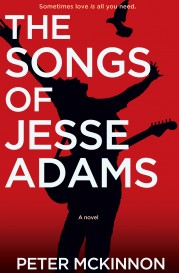A review of The Songs of Jesse Adams by P eter McKinnon. Published by Acorn.
eter McKinnon. Published by Acorn.
I am cautious about reviewing Christian fiction titles. Partly this is because I think our standards are lower than secular audiences when it comes to Christian fiction, while, at the same time, our standards for Christian non-fiction are higher!
Another reason is that I have an unpublished manuscript in my desk drawer that no-one else has read, and I know the pain I went through to compile the manuscript and the potential humiliation I face by opening that drawer and sharing its contents. It is very difficult to critique someone’s creative work. A poet I know compares writing to giving birth, and as a mother I would be really offended if someone told me my baby was ugly!
So I approached The Songs of Jesse Adams with trepidation. Not only is it a work of fiction, but the author has also chosen a highly difficult task: to imagine what it would be like if Jesus was not born 2,000 years ago in Palestine, but in the 1960s in Melbourne, Australia.
I can gladly say that this is a really good book. It is very well-written. Peter McKinnon is a psychologist and former business executive, and he brings that professionalism and experience to the task of composing this novel.
It is also fascinating to see how McKinnon reframes the Jesus story, and he has achieved some lovely twists and turns. For example, Jesse/Jesus is attended by Aboriginals rather than angels in the wilderness, and beer rather than water is turned into wine!
There is a very Australian take on what God is like:
God is the Keeper, the one who stands behind you. The safe hands, the soft and weathered leather that will never let anything run away and be lost, always there to catch you. Won’t drop you, won’t let you go.
McKinnon’s Jesus is a rock star rather than merely a preacher, although it is a fair comparison. In the ancient world, crowds would gather to hear an interesting teacher, and each philosopher had their own following. Music gives Jesse Adams the vehicle for his preaching.
McKinnon has done a good job of dealing with Jesus and celebrity, Jesus and the media, Jesus and the modern church.
This portrayal of Jesus will alienate some (just as the original did), as McKinnon’s most recent work with World Vision comes out in the distinctly social justice flavour of Jesse Adams’ work. The book is also less clear in referencing God, with the metaphor of “falling light” in song and speech usually preferred to the term ‘God’, which has “too many bad associations, too limiting”. Jesse also sums up his teaching as “Love wins”, which may or may not be a reference to Rob Bell.
However, there are some real delights as we are led deeper into imagining what it would have been like for Jesus, the expectations of him:
Flailing limbs, desperate voices, clambering and calling out… the woman with the shattered spirit would stop him with her tears or the young bloke with polio legs would fall about him on the pavement. And he would stop and empty himself once more and leave them changed and wondering, then escape again, drained and worried if anyone, even those closest to him, really understood.
I was challenged by some of the company Jesse kept: pimps, gamblers, sex offenders, crook business people… then realised that is actually what Jesus did!
The translation into 60s’ motifs works well:
Here and there Jesse would stop and talk about how to live and how to love and when to give way and when to stand up. About all the colours of heaven and earth and the angels that kept and the dragons that haunted. About what was broken and how it could mend, and how the music was sweet but didn’t last, but love was wine and did.
I loved Jesse’s intimate relationships with men and women, passionate and pure. In the end there is a very modern twist, as his innocent welcome of children is turned against him.
This is a great read, and Acorn should be congratulated for taking on the risk of their first fiction publication. This is a book that could be used as a discussion starter in book groups, and is an easy gift for a friend to start a conversation about the real Jesus and what he did.
Kara Martin is the Associate Dean of the Marketplace Institute, Ridley Melbourne, has been a lecturer with Wesley Institute and is an avid reader and book group attendee. Kara does regular book reviews for Eternity.
Email This Story
Why not send this to a friend?

